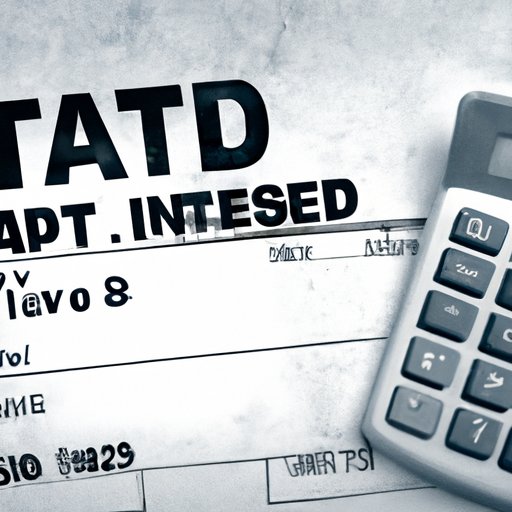Introduction
Tax season is usually a stressful time for many individuals and businesses. The Internal Revenue Service (IRS) sets a deadline each year for filing taxes, and if you don’t meet it, there can be serious consequences. This article will explore what happens if you are late filing taxes and the potential penalties, interest rates, and other issues you may face.
The IRS’s “Failure to File” Penalty
If you don’t file your taxes on time, you may be subject to the “failure to file” penalty. This penalty is assessed by the IRS, and it applies to anyone who fails to file their taxes by the due date. The penalty is typically 5% of the amount owed per month, up to a maximum of 25%. For example, if you owe $1,000 in taxes and don’t file by the due date, you could be subject to a penalty of $50 per month (5% x $1,000).
Refunds and Not Filing
If you don’t file your taxes and you’re due a refund, you won’t receive it until you file. According to the IRS, you have three years from the original due date to file a return and claim your refund. If you don’t file within that time frame, you forfeit your right to the money.
If you miss the deadline, you should still file as soon as possible. You may still be able to claim some of the deductions and credits you’re entitled to, even if you’re late filing. The sooner you file, the less likely you are to be subject to penalties or interest.

Interest Rate for Late Tax Payments
If you’re late filing taxes and you owe money to the IRS, you may also be charged interest on the amount. The interest rate is determined by the federal short-term rate plus 3%. For example, if the federal short-term rate is 2%, you would be charged an interest rate of 5% on any unpaid taxes.
The interest rate is compounded daily, which means the amount owed can quickly add up. It’s important to pay your taxes as soon as possible to avoid accruing additional interest.
Statute of Limitations on Back Taxes
The IRS has a 10-year statute of limitations on collecting back taxes. This means the IRS can take legal action to collect any unpaid taxes within this timeframe. After 10 years, the debt is considered “time-barred” and the IRS cannot take any further action. However, this doesn’t mean the debt is forgiven. You still need to contact the IRS and make arrangements to pay any outstanding taxes.

Tips for Dealing with Late Filing
If you find yourself in the position of having to file late taxes, there are a few things you can do to reduce the potential penalties and interest. First, you should contact the IRS as soon as possible to explain why you are late filing. In some cases, the IRS may waive the penalties or reduce the interest rate. Second, you can request an extension to give yourself more time to file your taxes. Third, you can set up a payment plan with the IRS to spread out the payments over a period of time.
Tax Relief Programs Available
If you’re unable to pay your taxes, there are several tax relief programs available. The IRS offers several options, such as an installment agreement, offer in compromise, and currently not collectible status. Depending on your financial situation, one of these options may be available to help you pay off your taxes.
Conclusion
Late filing taxes can have serious consequences, including penalties, interest, and even legal action. It’s important to file your taxes on time to avoid these issues. If you find yourself in the position of having to file late taxes, there are steps you can take to reduce the penalties and interest, as well as tax relief programs available to help you pay your taxes. Remember, filing your taxes on time is the best way to ensure you don’t face any penalties or interest.
(Note: Is this article not meeting your expectations? Do you have knowledge or insights to share? Unlock new opportunities and expand your reach by joining our authors team. Click Registration to join us and share your expertise with our readers.)
